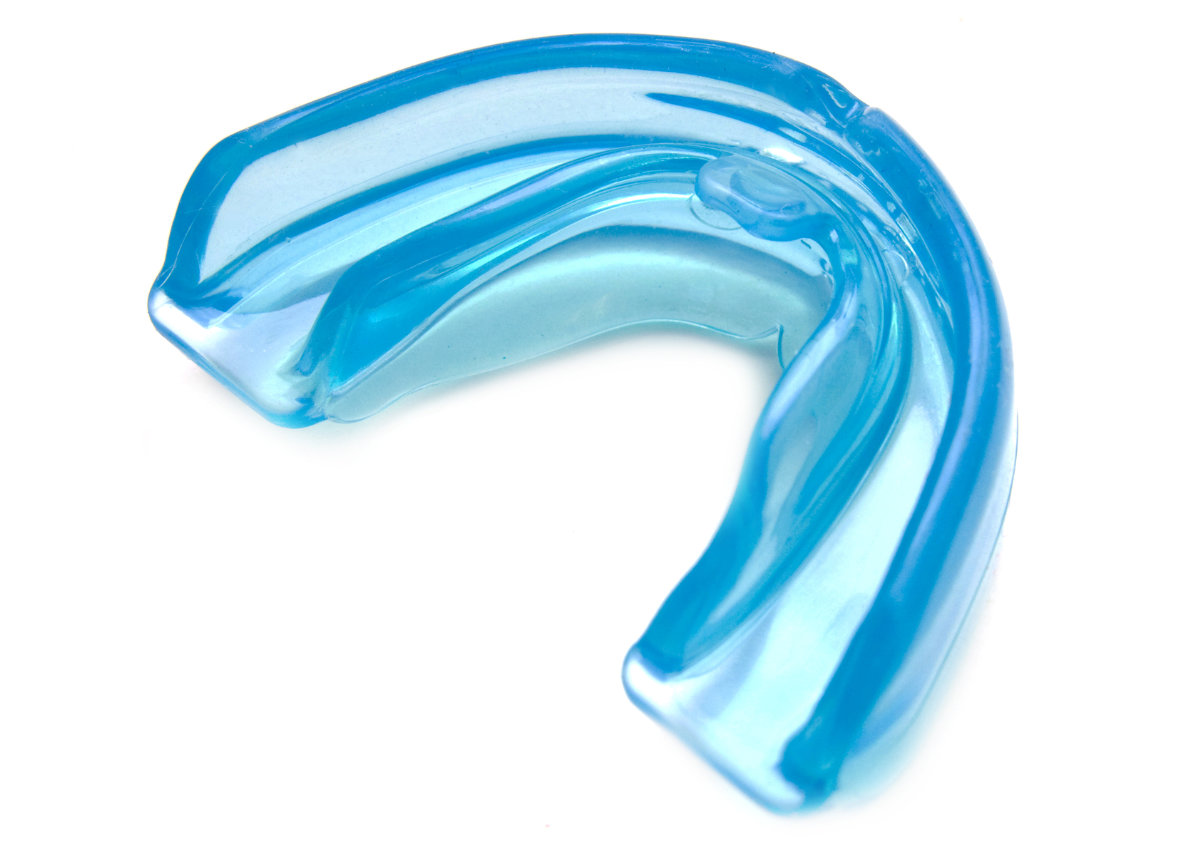
01
Jan
Mouth Guards

Anyone who participates in a sport that carries a significant risk of injury should wear a mouth protector. Sports like basketball, baseball, gymnastics, and volleyball all pose risks to your gum tissues, as well as your teeth. We usually think of football and hockey as the most dangerous to the teeth, but nearly half of sports-related mouth injuries occur in basketball and baseball.
A helmet can prevent serious injuries such as concussions, cerebral hemorrhages, incidents of unconsciousness, jaw fractures and neck injuries by helping to avoid situations where the lower jaw gets jammed into the upper jaw. Mouth guards are effective in moving soft tissue in the oral cavity away from the teeth, preventing laceration and bruising of the lips and cheeks, especially for those who wear orthodontic appliances.
Mouth protectors, which typically cover the upper teeth, can cushion a blow to the face, minimizing the risk of broken teeth and injuries to the soft tissues of the mouth. If you wear braces or another fixed dental appliance on your lower jaw, a mouth protector is available for these teeth as well.
A properly fitted mouth protector may be especially important for people who wear braces or have fixed bridge work. A blow to the face could damage the brackets or other fixed orthodontic appliances. A mouth protector also provides a barrier between the braces and your cheek or lips, limiting the risk of soft tissue injuries. Although mouth protectors typically only cover the upper teeth, your dentist or orthodontist may suggest that you use a mouth protector on the lower teeth if you have braces on these teeth too. If you have a retainer or other removable appliance, do not wear it during any contact sports.
Request an Appointment
Types of mouth guards
There are three types of mouth protectors:
- Stock – Inexpensive and come pre-formed, ready to wear. Unfortunately, they often don’t fit very well. They can be bulky and can make breathing and talking difficult.
- Boil and bite – Can be bought at many sporting goods stores and may offer a better fit than stock mouth protectors. They should be softened in water, then inserted and allowed to adapt to the shape of your mouth. If you don’t follow the directions carefully you can wind up with a poor-fitting mouth protector.
- Custom-fitted – Made by your dentist for you personally. They are more expensive than the other versions, but because they are customized, they can offer a better fit than anything you can buy off the shelf.
Mouthguard FAQs
Would you like to protect your smile with a mouthguard in Eaton Rapids, Michigan? Since several mouthguard options are available, it’s easy to be confused about the best dental guard for your smile. Douglas Hoppe DDS has answers to the most commonly asked questions about mouthguards to keep you informed before you get one.
It’s a removable dental device that protects your teeth, gums, lips, and cheeks from sports injuries and other factors like bruxism. Dental guards fit over the upper teeth and sometimes the lower teeth to absorb forces from blows, knocks, teeth grinding, etc.
There are three types of mouthguards:
• Generic: These are mouthguards that come pre-made and ready to wear. Since these oral devices aren’t created with impressions of your mouth, they rarely fit well and don’t offer optimal protection
• Boil and bite: These mouthguards offer a better fit than stock mouthguards. Boil and bite dental appliances are softened with hot water, then inserted in the mouth and allowed to take the shape of the mouth. While these mouthguards work, they aren’t the best for your smile
• Custom-fitted: These dental appliances are made by a dentist specifically for your smile. Bespoke mouthguards are fabricated after taking impressions of your bite, resulting in appliances that fit your teeth and gums like a glove
The process starts with a consultation with a dentist to determine your need for a mouthguard—you may need one for sports, bruxism, or sleep apnea. Next, the doctor takes digital scans of your teeth to be used by the dental lab to create your mouthguards. Once we receive your custom mouthguard, you’ll return to the dentist for a fitting. The dentist will ensure the mouthguard fits comfortably and securely, and any necessary adjustments will be made before you go home.
Although expensive, customized mouthguards offer maximum protection compared to anything you buy off the shelf. These mouthguards fit snugly over your teeth, so they won’t shift or fall off after a blow or knock. Bespoke mouthguards protect your smile at all times, unlike stock dental guards that can let you down when you need them most.
Additionally, personalized mouthguards are created with high-quality materials, offering a durable solution. These mouthguards can be used for many years before they need replacement. Also, personalized dental guards provide a comfortable fit, allowing you to speak and breathe normally.
If you have an athletic mouthguard, you should wear it when participating in your favorite sports. Sports guards are popular for contact sports like football, boxing, and hockey. However, athletic mouthguards are also essential for non-contact, high-risk sports like skiing, skating, cycling, etc.
If you have a nightguard for bruxism, TMJ, or sleep apnea, you should wear it when sleeping because these habits are likely to strike at night. However, wear your dental guards as directed by your dentist because oral habits that typically occur at night (like bruxism) can happen during the daytime.
Like your teeth, your dental guard needs optimal care to protect them from harmful bacteria that can cause infection or bad breath. So, what does mouthguard care involve? It’s easy. Rinse your dental appliance with warm water (never hot) to eliminate any traces of food debris. Brush your mouthguard with a soft-bristled toothbrush and fluoride toothpaste. Store your mouthguard in a clean, dry case when not in use.
Want to learn more about mouthguards? Please call (517) 667-7066 to talk to Douglas Hoppe DDS of Eaton Rapids, MI. We look forward to serving you.
Share this Article
What Our
Patients Say
We always want to assure that our patients receive great care and have good experience when they come to see us.


